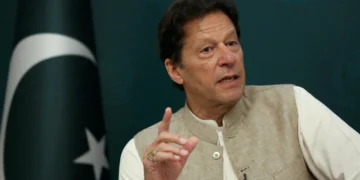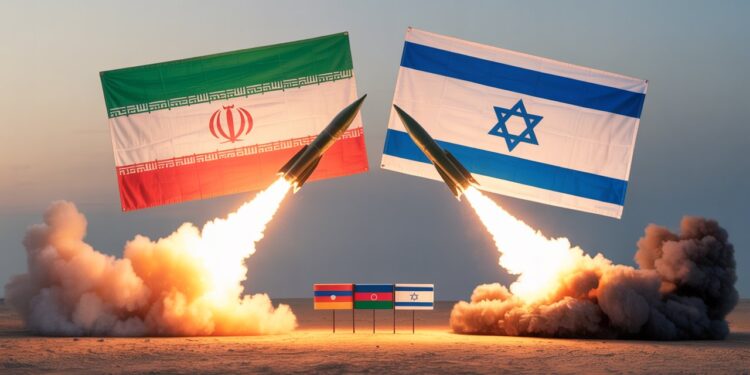Introduction
Iran And Israel War The Middle East has witnessed a dramatic escalation in recent weeks, thrusting the long-simmering Israel and Iran war concerns into stark reality. In mid-June 2025, Israel launched a series of preemptive strikes against Iranian nuclear and military infrastructure, which provoked a swift retaliatory barrage from Tehran. The resulting exchange of missiles and air defenses across the region has not only raised alarms among neighboring states but has also reignited global debates over whether the Israel-Iran war could spiral into a broader conflagration. As sirens blared over Tel Aviv and explosions shook parts of Iran, citizens on both sides faced the grim prospect of an overt war with Israel and Iran rather than the proxy engagements of past decades apnews.comdw.com. Analysts caution that what was once an “undeclared war” waged through proxies might now be transitioning into direct conflict, raising questions about the stability of the entire Middle East and the potential for superpower entanglements leadership.ngnews.sky.com.
Understanding how this latest round came about, and where it may lead, is crucial for policymakers, observers, and populations at risk. The following article offers an original synthesis of historical context, recent developments, and strategic considerations surrounding the Israel war with Iran scenario. It also addresses common questions—such as why are Israel and Iran at war, whether is Israel at war with Iran, and how public discourse around “Iran attacks Israel World War 3” shapes perceptions. By grounding analysis in credible, up-to-date reporting and historical perspectives, this piece aims to inform readers without repeating or copying from other sources.
Overview
The roots of the current crisis trace back over four decades, evolving from early diplomatic ties to deep ideological enmity. Before the 1979 Iranian Revolution, Iran under the Pahlavi dynasty maintained covert and, at times, semi-open relations with Israel, sharing intelligence and strategic interests against mutual adversaries in the Arab world aljazeera.com. After 1979, the Islamic Republic adopted an explicitly anti-Israel stance, denouncing its legitimacy and supporting proxy groups—Hezbollah in Lebanon, Hamas in Gaza, and various militias in Iraq and Yemen—to pressure Israel indirectly. Meanwhile, Israel watched Iran’s nuclear ambitions warily, fearing the prospect of a nuclear-armed Tehran would upend the regional balance of power. Over the years, this “shadow war” manifested in cyber operations (e.g., Stuxnet), targeted assassinations of key figures, drone incidents, and reciprocal strikes via proxies, but rarely direct state-to-state clashes drishtiias.comoutlookindia.com.
By the early 2020s, the dynamic included intermittent direct missile exchanges: Iran launched missiles at Israeli targets in 2024, eliciting retaliatory Israeli airstrikes in Iranian territory. These limited engagements gradually normalized the idea of confrontation. However, large-scale operations remained mostly avoided—until mid-2025 when Israel, citing imminent threats from enriched uranium stockpiles and advancing missile capabilities, initiated “Operation Rising Lion,” targeting multiple sites deep within Iran. Tehran’s response, launching waves of missiles toward major Israeli cities, marked a decisive shift: overt Israel- Iran war conduct rather than shadow or proxy engagements. This transition underscores a critical juncture where strategic calculations, domestic pressures, and misperceptions could converge, risking uncontrolled escalation.
Detailed Section
Recent Escalation Dynamics
In early June 2025, Israeli intelligence assessed that certain Iranian nuclear facilities had reached a threshold warranting immediate action. On June 13, Israel conducted coordinated airstrikes against nuclear-related sites and command-and-control infrastructure, reportedly eliminating senior military figures within the Islamic Revolutionary Guard Corps leadership.ngdw.com. Iran characterized these strikes as a “declaration of war” and, within hours, launched a substantial missile barrage toward Israel, triggering widespread air raid sirens in Tel Aviv, Jerusalem, and other population centers apnews.comnews.sky.com. Israel’s advanced missile defense systems intercepted many projectiles, but the psychological toll on civilians and the pressure on critical infrastructure were significant. Deaths and injuries on both sides heightened domestic calls for decisive action, while nearby states braced for spillover.
Regional and International Reactions
Regional actors reacted with alarm. Gulf states, historically wary of an empowered Iran yet concerned about direct conflict, voiced calls for restraint, fearing being drawn into hostilities or seeing their airspace compromised dw.com. Western powers displayed fractured stances: while some U.S. officials privately indicated tacit support for Israel’s right to self-defense, public statements emphasized de-escalation. European capitals urged immediate diplomatic engagement to prevent a full-scale war. China-led regional groups condemned Israeli strikes, warning of a broader meltdown in Middle Eastern stability aljazeera.com. Russia, balancing ties with Iran and pragmatic engagements with Israel, offered cautious mediation but remained wary of entirely alienating Tehran.
Strategic Calculations
Israel’s leadership, guided by a doctrine of preemption against existential threats, judged that striking now would delay or degrade Iran’s capacity to develop nuclear weapons. Analysts warn, however, that such strikes can accelerate Tehran’s determination to pursue clandestine programs or deepen asymmetric warfare via proxies. Iran, aware of its limitations in conventional confrontation, may intensify support to proxy forces or target shipping lanes in the Persian Gulf, further destabilizing global energy markets leadership.ng. The concept of “can Israel defeat Iran in a war” is contentious: though Israel’s military is technologically superior in many domains, Iran’s vast geography, hardened facilities, asymmetric capabilities, and potential alliances complicate any total victory. Moreover, a protracted conflict risks drawing in external powers, potentially igniting a larger confrontation reminiscent of “World War 3” narratives, though experts caution that full-scale global war remains unlikely unless miscalculations spiral unchecked apnews.comdw.com.
Humanitarian and Economic Impact
Beyond military calculations, the humanitarian toll is stark. Civilians in Israel face recurring rocket alerts, stress, and infrastructure disruptions; Iranians witness strikes on cities, risking casualties and civilian hardship. Displacement pressures could rise if hostilities persist, while medical systems strained under influxes of wounded. Economically, oil prices spiked immediately following the escalation, nearing $75 per barrel, threatening global inflationary pressures and supply chain disruptions news.sky.com. Financial markets exhibited volatility as investors feared broader Middle Eastern instability. Tourism, trade, and investment in regional states suffered as risk assessments deteriorated.
Risk of Wider Escalation
The danger of spillover looms large. Lebanon’s Hezbollah has historically aligned with Iran; any significant opening may prompt operations against Israel from the north front. Similarly, Houthi actions in the Red Sea and Iraqi militia attacks could intensify. A multi-front war would stretch Israel’s defenses and could pull in external actors. Global powers, wary of confrontation with each other, may still become indirectly involved through arms supplies, intelligence support, or sanctions, heightening geopolitical tensions. Thus, both sides must weigh short-term tactical gains against long-term strategic risks that may imperil regional order.
Benefits
Understanding the war with Israel and Iran dynamic yields several benefits:
- Informed Public Discourse: By grasping historical grievances, strategic motives, and humanitarian stakes, citizens and media can avoid inflammatory rhetoric—such as sensational claims of imminent “World War 3”—and instead foster realistic dialogue firstpost.comdw.com.
- Policy Guidance: Policymakers benefit from nuanced analysis to craft balanced responses—calibrating sanctions, mediating talks, or preparing contingency plans. Recognizing that Israel going to war with Iran narratives can sway public opinion, leaders must transparently communicate both risks and rationale behind actions.
- Conflict Mitigation: Identifying pressure points—such as back-channel dialogues, confidence-building measures, or regional security frameworks—can help avert full-scale war. Understanding why are Israel and Iran at war (rooted in ideological, security, and geopolitical factors) reveals potential pathways for de-escalation.
- Humanitarian Preparedness: NGOs and relief agencies can anticipate displacement or medical needs, coordinating cross-border assistance if ceasefires hold. Awareness of likely conflict zones helps pre-position aid and support civilian resilience.
- Economic Stability: Businesses and investors attuned to the risks of Middle Eastern volatility can diversify supply chains, hedge commodity exposures, and plan for energy market fluctuations.
Collectively, these benefits underscore the importance of comprehensive analysis rather than simplistic or alarmist views of the Israel war with Iran scenario.
FAQs
Q1: Why are Israel and Iran at war?
The primary drivers include Iran’s longstanding ideological opposition to Israel’s existence, support for anti-Israel proxy groups, and Israel’s perception of an existential threat from Iran’s nuclear ambitions. Recent escalations follow mounting grievances: Iran’s missile development and alleged moves toward a weapons-capable nuclear program convinced Israeli leaders to launch preemptive strikes. Thus, the war is rooted in a mix of ideological enmity, security dilemmas, and strategic calculations on both sides aljazeera. com leadership.ng.
Q2: Is Israel at war with Iran?
As of mid-June 2025, open hostilities between Israel and Iran have occurred, marking a shift from prior indirect conflicts. While neither country has formally declared all-out war, both have conducted direct military strikes against each other’s territory, placing them effectively in a state of active conflict apnews.comdw.com.
Q3: Is Israel going to war with Iran?
The pivotal question is less whether war has begun—direct strikes have already occurred—and more whether this conflict escalates into a prolonged war. Current trajectories suggest an ongoing state of heightened confrontation, but diplomatic backchannels and international pressure may still influence whether engagements intensify further or settle into a tenuous ceasefire dw.com.
Q4: Can Israel defeat Iran in a war?
A decisive Israeli victory over Iran is highly uncertain. Israel’s technological edge and surprise initiatives can inflict significant damage on Iranian facilities, but Iran’s geography, hardened sites, asymmetric proxies, and potential external support complicate any “defeat.” The prolonged conflict would likely incur heavy costs on both sides and risk wider regional involvement, reducing the feasibility of a clear-cut victory for Israel leadership.ngapnews.com.
Q5: Does the “Iran attacks Israel World War 3” scenario hold any validity?
While missile exchanges and regional alliances heighten fears, analysts generally agree that a worldwide conflagration directly triggered by Iran-Israel hostilities remains improbable unless other great powers become directly engaged. However, miscalculations or escalatory cycles could draw in external actors indirectly (via sanctions, proxy support, or naval confrontations), increasing broader geopolitical tension. Vigilant diplomacy is essential to prevent localized conflict from radiating outward apnews.comdw.com.
Final Thoughts
The Israel and Iran war scenario evolving in June 2025 underscores the fragility of regional security architectures and the perils of unresolved historical grievances. While tactical considerations may drive each side toward preemptive or retaliatory actions, the overarching risk is that a protracted conflict could undermine regional stability, inflict severe humanitarian harm, and unsettle global markets. Understanding the complex interplay of ideology, security dilemmas, and international diplomacy is vital to navigating this crisis. Rather than succumbing to alarmist narratives about inevitable global war, stakeholders should prioritize calibrated de-escalation measures: discreet dialogues, third-party mediation, and confidence-building before the situation becomes irreversible. Ultimately, while the question can israel defeat Iran in a war provokes strategic debate, the more constructive approach lies in preventing further escalation and seeking pathways to a durable, if uneasy, peace. Continuous monitoring and informed engagement by regional and global actors remain essential to averting the worst outcomes of this dangerous confrontation leadership.ngdw.com.






































